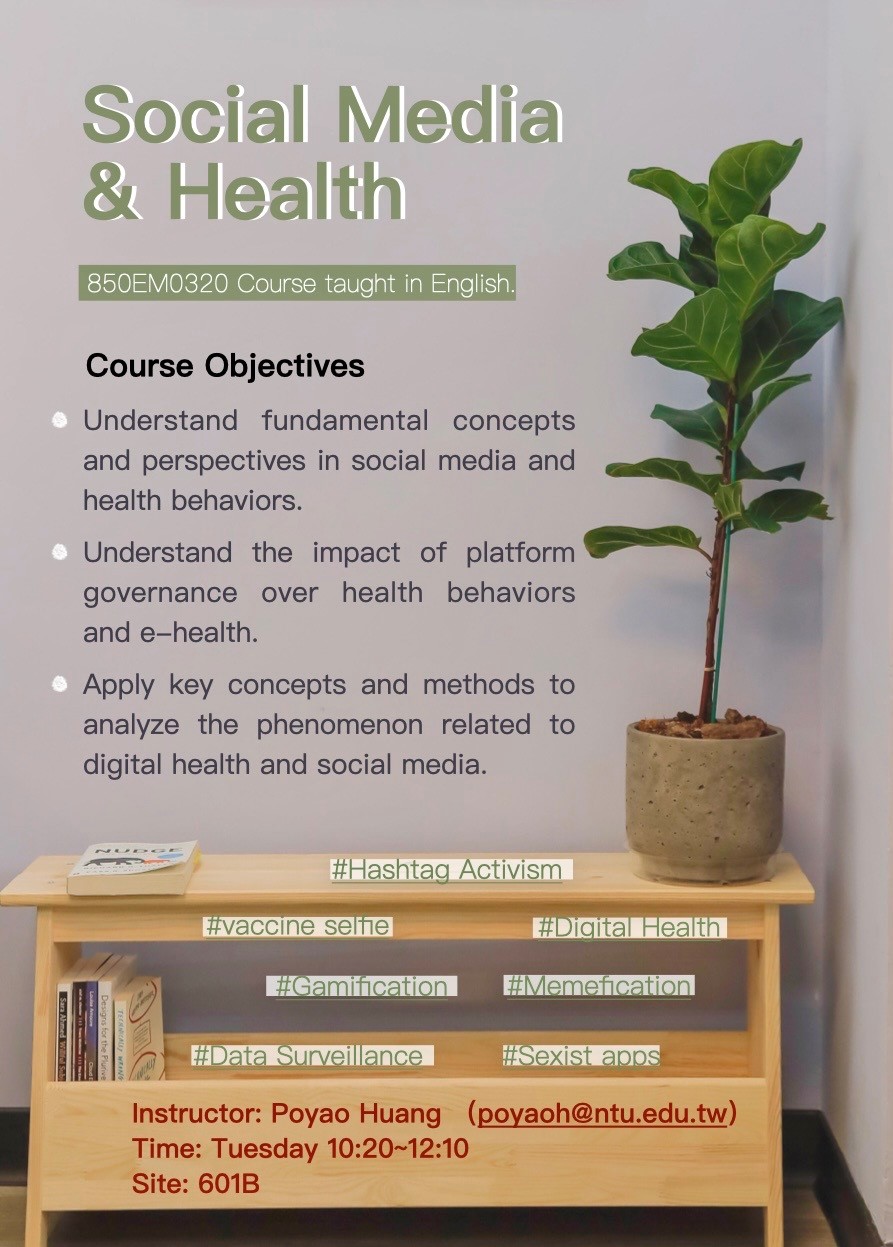
行社所黃柏堯老師111-2開設 全英文授課選修課程,課名為「Social Media and Health 」,歡迎有興趣同學選修。以下為課程介紹:
這學期的社群媒體與健康(英文授課),會是一個以介紹基礎理論跟學科對話的Seminar與實作課程。學期有十六週,但是我們預計透過七至十週的時間,帶大家回到傳播研究、社會科技研究、及健康研究等相近學門在面對這些新興科技與健康議題時,學習他們的不同理論跟方法。從“e-health“跟”social media“這兩個字出發,我們兼顧理論與實務,包括數位健康的一些行為研究(uncertainty management不確定性理論的應用、opinion leader意見領袖、two-step flow兩級傳播);病人的意見論壇與書寫(patient narratives and blog);平台控管與商業化(platform governace and commodification);交友軟體的設計與性健康決策過程的影響(Social App and health decision making process);網路霸凌跟數位適能(cyberbully and e-literacy);數位健康遊戲化的心理狀態與頁面設計(gamification and nudge); 以及在大數據AI的脈絡下我們怎麼重新斯訊息的表面價值、真理、客觀性、以及交換價值。
這是一個英文課程,所以我們會全程使用英文,但是會在適度的時候讓學生也可以用他們自己習慣的語言進行討論或是報告。這學期的課程會減少學生的閱讀總量,有比較多的時間仔細討論課程內容。我們也會engage人工智慧ChatGPT。課程不把ChatGPT當作用來同學是否會抄襲作業的警備機器,而是透過跟ChatGPT「玩在一塊兒」(as queer theory and STS object-oriented theories informed us)的策略,測試如何在人工智慧跟大數據的基準下,人的參與姿態如何變成了ChatGPT的一部分,我們可以很敵意地站在ChatGPT的外圈,指責AI可能會對學術帶來的原創、抄襲傷害;我們也可以從酷兒或是科技社會理論借徑,從AI內部運作邏輯反思,我們怎麼樣創造一個ethical的新的、更好的、甚至更正義的AI。
期末報告有幾個選項:(1)與你論文相關,約5頁左右的企劃書;或是(2)跟著課堂文獻回顧,利用課堂上的文章,寫出約莫五頁的文獻回顧;或是,(3)利用ChatGPT發展出一套能夠跟他對話的範本,提出創造ethical AI 的建言,第三項作業可以為團體作業。總之我們希望學生離開這個課堂,能夠發展出一個可行的研究計畫,或是發展出一個紮實的文獻對話能力。我會在下週二課堂上介紹課程大綱,第一週沒有讀物,歡迎有興趣的同學來修習。
同時甄聘本課程助教,須為行社所學生,意者請來信,謝謝
Welcome to Spring 2023. I want to draw your attention to “Social Media and Health” (HBCS 7031), a seminar that will cover the foundation of communication, social media, and health (broadly defined). The course materials attend to explore the promises and problems of e-health technologies, offering students hands-on opportunities to develop their interests and expand their areas of expertise. The course will consider the impacts of, for example, selfies, dating apps, gamification, fake news, and data surveillance and also think through the methods related to conducting research online. While it’s impossible to pack all social media and health-related topics in this course, we can’t ignore ChatGPT. However, we will not utilize this AI implication as a means to detect plagiarism. We instead play with ChatGPT, using a queer- and STS-informed approach to thinking through the alternatives, asking ethical research questions, and conducting research with AI. Besides the conventional final options (term paper and mini-literature review), the course materials and presentations offer students opportunities to explore this uncharted frontier to think about how to engage AI in future health interventions more meaningfully.
There is no required reading for the first week. I am in the middle of finalizing the syllabus. If you have any questions, please email poyaoh@ntu.edu.tw

